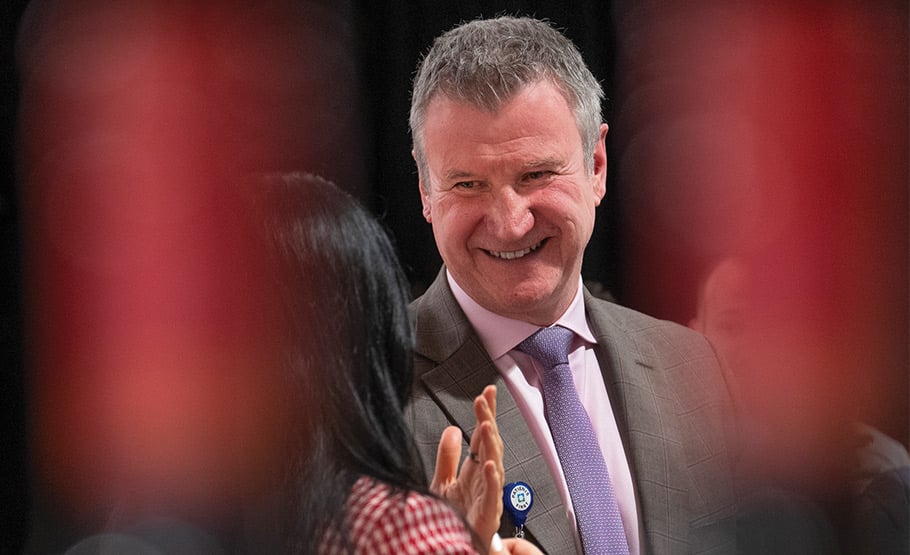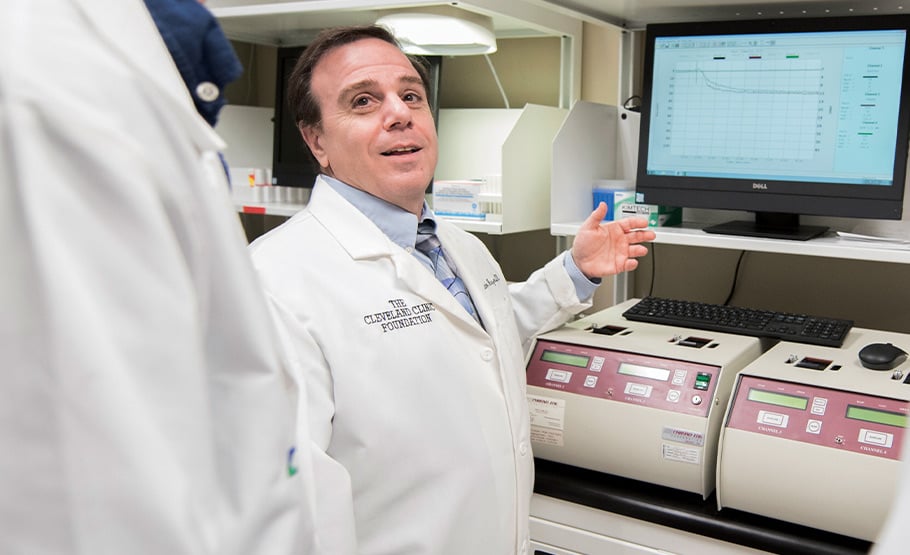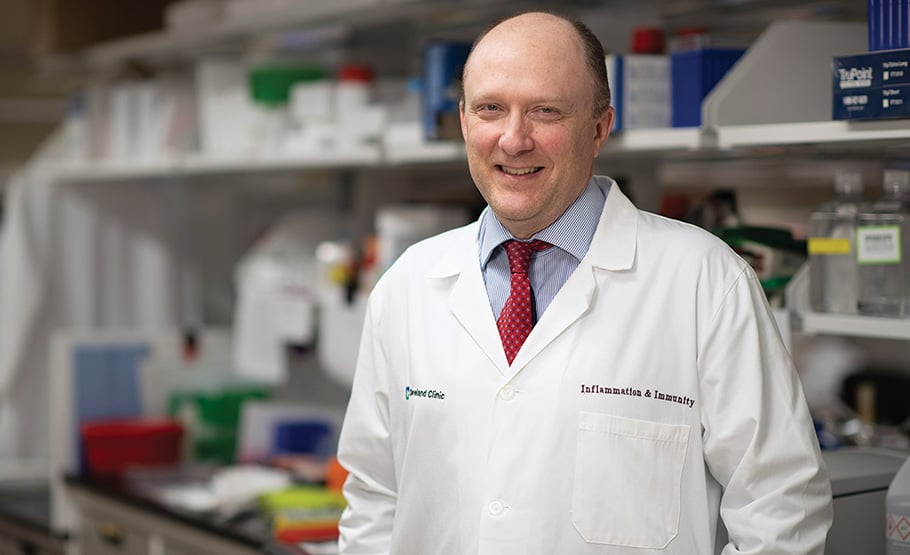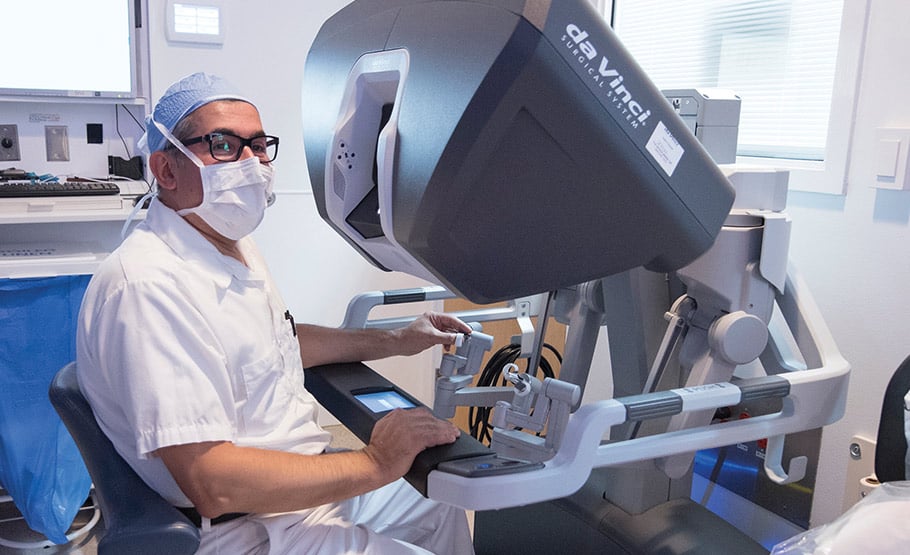Inside the Innovation Factory
Three new startups demonstrate how Cleveland Clinic Innovations is helping translate good ideas into patient-centered solutions.
FEATURE
By Ashley Rabinovitch
In a community of more than 80,000 caregivers, there is always a good idea around the next corner.

“Our mission is to take brilliant ideas that Cleveland Clinic caregivers generate,” says Dr. Geoff Vince, “and bring them to market as quickly as possible to help patients.”
Photo: Don Gerda
Whether it’s a seed of a concept for a new technology platform or a novel therapeutic drug, it may have the potential to improve clinical outcomes for millions of patients. But an idea is just an idea without someone to implement it, and the gap between the clinic and the boardroom can feel like a chasm for even the most determined of inventors.
Since 2000, Cleveland Clinic Innovations (CCI) has worked to bridge that gap. Taking a unique team approach to commercialization, the international health system’s commercialization team has provided the infrastructure necessary to launch more than 40 active startups. Each new company pairs a Cleveland Clinic clinician or scientist with a visionary business executive to achieve commercial success, meeting patient needs that have historically gone unmet.
CCI is led by Executive Director Geoff Vince, PhD, a prolific inventor in his own right with a dozen patents to his name. He holds the Virginia Lois Kennedy Endowed Chair in Biomedical Engineering and Applied Therapeutics.
“Our mission is to take brilliant ideas that Cleveland Clinic caregivers generate,” Dr. Vince says, “and bring them to market as quickly as possible to help patients.”

Dr. Stan Hazen, center, is the founder of Zehna Therapeutics, an early-stage biotech company focused on treating chronic disease by developing novel small molecules that target specific gut microbial pathways.
Photo: Willie McAllister
Reimagining Therapeutics
While maintaining its historic focus on digital health, Cleveland Clinic Innovations is poised for expansion in the area of therapeutic drug development — and Stan Hazen, MD, PhD, is perfectly positioned to help lead the way.
A physician-scientist who chairs the Department of Cardiovascular and Metabolic Sciences at the Lerner Research Institute, Dr. Hazen has spent the past 20 years exploring strategies to prevent cardiovascular and renal diseases, the leading causes of morbidity and mortality worldwide. He is the holder of the Jan Bleeksma Chair in Vascular Cell Biology and Atherosclerosis.
Dr. Hazen believes that the road to better prevention leads through the gut. “It’s clear that there are pathways in the body that influence disease through the bacteria in our intestines,” he says. For years, his lab examined vast quantities of patient data to identify compounds in the blood that signal cardiac risks. They eventually homed in on TMAO, a compound produced by gut bacteria after eating animal products like red meat and eggs. In a highly cited paper, they demonstrated a strong connection between TMAO levels in the blood and the future development of chronic heart and kidney disease, and they used preclinical model studies to show a causal role for TMAO.
Dr. Hazen realized that if he and his team could develop a drug to inhibit gut bacteria from producing TMAO, they could prevent TMAO from influencing the development of future diseases. A new company, Zehna Therapeutics, began to take shape after they developed multiple inhibitors of the gut bacterial enzyme that contributes to TMAO production, and then demonstrated provision of the drug reduced cardiac disease. As the first drug that blocks a bacterial pathway without acting like an antibiotic and yet produces a beneficial effect in the host to prevent a chronic disease, this new class of inhibitors represents a groundbreaking approach to treating human disease.
Under the leadership of Dr. Hazen and Camilla Simpson, an experienced biotech executive who has served as CEO of the company since 2021, Zehna will begin testing the inhibitor in clinical trials in 2025.
The TMAO pathway inhibitors already show benefit in multiple preclinical models of various cardiovascular diseases, chronic kidney disease and obesity. In the long term, Zehna aims to expand its focus beyond TMAO to develop inhibitors of alternative gut bacterial pathways with clinical and mechanistic links to human diseases. “In the future, there will be many companies focused on developing similar drugs,” says Dr. Hazen. “We wanted to be the first.”
With the help of CCI, Zehna Therapeutics is well on its way.

“With the guidance of Cleveland Clinic Innovations,” says Dr. Thaddeus Stappenbeck, “we’ve been able to move forward and seize opportunity at the intersection of personalized medicine and gut health.”
Photo: Don Gerda
Eliminating the Coin Toss
A key strength of Cleveland Clinic Innovations lies in its team approach to the technology transfer process. Traditionally, innovation managers work with a broad portfolio of inventors in various stages of the commercialization process. A company about to launch might monopolize a manager’s time, making it difficult for the manager not to put other inventors on the back burner and leave them feeling neglected. By dividing its 60-plus employees into distinct teams to tackle each phase of the process, CCI has discovered a winning formula.
The Engagement Partners team makes first contact, helping inventors navigate the process of invention disclosure and market analysis. Then the Proof of Concept team connects the inventor with the resources to test and improve their idea before the Assessment team evaluates the commercial viability of the proposal. From there, the Innovations Development team helps the inventor transform a concept into a viable medical product. The Business Development and Licensing team moves the ball down the field by identifying strategic partners and executing licensing agreements, and the Ventures team completes the cycle by creating and investing in a spinoff company, when appropriate, based on the inventor’s technology.
Every year, CCI tracks hundreds of interactions with physicians, nurses, lab techs, scientists and other caregivers within Cleveland Clinic’s ecosystem. Roughly 10% of ideas will make it as far as the Innovations Development team, which will then pursue a handful of concepts. CCI has historically launched one to three companies per year, and it’s picking up steam.
“We’ve experienced rapid growth over the past two years,” Dr. Vince says, “which has put us in the best possible position to move even more technologies forward and improve millions of patients’ lives.”
“We’ve experienced rapid growth over the past two years which has put us in the best possible position to move even more technologies forward and improve millions of patients’ lives.”
Dr. Geoff Vince
Thaddeus Stappenbeck, MD, PhD, Chair of the Department of Inflammation and Immunity, credits CCI with providing the tools he needed to found Mobius Care, a new company that taps the power of artificial intelligence (AI) to offer personalized care for inflammatory bowel disease (IBD).
Like many physician-scientists, Dr. Stappenbeck feels most at home in a clinic or a lab. “Starting a business is everything I’m not trained for,” he says. “Especially in the early phases, you need the right leadership and infrastructure to implement a great idea.”
He connected with CCI in 2020 and began the journey to commercializing an idea that improves treatment for IBD, an umbrella term for Crohn’s disease and ulcerative colitis.
Most people have a friend or family member who has spent years cycling between inflammatory drugs in search of relief for IBD. “Taking an anti-inflammatory is like a coin toss,” says Dr. Stappenbeck. “Any given drug will work in about half of the people who take it. And that coin toss has consequences because the immune system changes in response to a drug, increasing the chances of failing additional treatments.”
Dr. Stappenbeck, who holds the Sherwick Endowed Chair in Inflammation and Immunity, has spent the past 20 years investigating how wounds to the lining of the intestine, usually from infection, can lead to IBD when repair mechanisms fail. With the support of CCI, he developed an AI tool that provides an unprecedented view inside an individual’s gut, with the goal of identifying which drug will be most effective in treating it. Historically, it would take a pathologist an hour to analyze a sample of tissue to derive this information. With AI, it takes under a minute.
Mobius’s AI tool has proven effective using data from academic and clinical trials, and
Dr. Stappenbeck and his team are in the process of refining it using more real-world data. In the long term, they not only aim to release more AI-based tools that personalize treatment for individual patients, but they also plan to develop therapeutic drugs that treat the dysfunctional wound healing that drives IBD.
“People want to know if their guts are healthy, and they need more than endoscopies and biopsies to give them information that can help,” says
Dr. Stappenbeck. “With the guidance of Cleveland Clinic Innovations, we’ve been able to move forward and seize opportunity at the intersection of personalized medicine and gut health.”

Dr. Jihad Kaouk teamed up with Cleveland Clinic Innovations to launch an ultrasound-based surgical navigation platform that provides real-time 3D imaging.
Photo: Yu Kwan Lee
Unlocking Potential
Cleveland Clinic Innovations conducts more than a dozen detailed assessments to determine whether a concept has legs. From market size to reimbursement mechanisms, there are countless factors to consider before throwing weight behind a new venture.
Method AI was an attractive proposition not just because of the new technology it has developed, but because of the way it makes existing technology more useful. The idea for the company originated in the operating room, where Jihad Kaouk, MD, a Cleveland Clinic urologist, uses the da Vinci robotic surgical system to perform surgeries for bladder, prostate and kidney cancer.
In the operating room, Dr. Kaouk commands a robot with a joystick and makes delicate movements based on what the camera connected to the robot displays on a screen. When using the robotic tool to cut out a tumor from an organ, he relies on images from an MRI or CT scan taken just before the surgery. Unfortunately, organs change as soon as surgery begins, limiting the usefulness of these images.
Together with Method AI CEO Doug Teany, Dr. Kaouk developed an ultrasound-based surgical navigation platform that provides real-time 3D imaging and an AI-generated surgical plan with live guidance. Rather than taking an educated guess at the margins of a tumor, a surgeon will see the tumor light up on the screen like a glowing golf ball, making removal more precise and complete.
Healthcare systems spend upwards of $2 million to install and maintain robotic surgery systems, yet robots are only used in 10% of eligible cases — with mixed results.
While a robot will never replace a physician in the operating room in the foreseeable future, Method AI will transform it from a mechanical tool into a collaborative partner in the surgical process.
“At Cleveland Clinic, we have surgeons at the forefront of their specialty, but we can be limited by the tools available to us,” says Dr. Kaouk, who is the holder of the Zegarac-Pollock Family Foundation Endowed Chair. “Method AI realizes the full potential of robotic surgery, which will lead to fewer complications, less recurrence of cancer and more longevity.”
For Dr. Vince and his team at Cleveland Clinic Innovations, inventors like Dr. Kaouk, Dr. Stappenbeck and Dr. Hazen infuse CCI’s mission with meaning and potential.
“Cleveland Clinic is home to some of the most gifted physicians and scientists in the world,” Dr. Vince says. “If you want to come up with medical solutions that change lives, this is the place to do it.”
